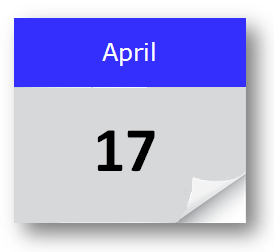The 17th of April is known as World Haemophilia Day which was created by the World Federation of Haemophilia to raise awareness of people suffering from the condition.
The 17th of April is also known as Evacuation Day in Syria, a day to commemorate their independence from France which is held on the anniversary of the evacuation of the last French soldiers in 1946.
The nation of Gabon celebrates ‘National Women’s Day’ annually on the 17th of April in commemoration of the first female member of government.
The 17th of April is the 107th day of the year (Gregorian calendar) or 108th in a leap year.
On the 17th of April 1949
Ireland or Eire officially became the Republic of Ireland. Following the “Easter Uprising” (24th-30th of April 1916) public support for the Irish Republican Party had grown. On the 14th of December 1918 as part of the United Kingdom’s general elections, votes cast in Ireland gave overwhelming support for the Irish Republican Party, (called Sinn Fein). However there was still massive support for the Unionist Party in the northern province of Ulster (this region would later become Northern Ireland). Instead of the elected members of Sinn Fein attending the Imperial Parliament in London, Sinn Fein created their own Parliament in Dublin called the ‘First Dáil Eirean’ (first Irish Assembly). On the 21st of January 1919 Sinn Fein declared Ireland’s Independence from the United Kingdom. On the same day two members of the Royal Irish Constabulary (RIC) were shot dead. This was the beginning of the Irish War of Independence. A large group of Irish gorilla fighters formed (some from the Irish Volunteers) and by September of 1919 they would be known as the Irish Republican Army (IRA). The IRA began “liberating” weapons for their cause from the UK forces. The UK declared both Sinn Fein and their government illegal and sent in troops. But with the army recovering from the losses of WWI many of the troops sent were ex-soldiers. The influx of soldiers in their tanned uniform and the black uniform of the police led to their nick name of ‘Black and Tan’. Many of the troops acted less than professionally, drunk brash and badly organised. The IRA were able to assassinate members of the Black and Tan then concil themselves as normal members of the public. On many occasions when members of the British armed forces were attacked they would open fire on civilians in retaliation. Many left the Royal Irish Constabulary and within 2.5 years the IRA had won their freedom. On the 6th of December 1921 the Anglo-Irish treaty was signed creating the Irish Free State. The Province of Ulster used the Ulster Month Clause to remain part of the United Kingdom and became Northern Ireland. Under the Statute of Westminster in 1931 Ireland and many countries gained full legislative independence and on this day in 1949 Ireland became a republic denouncing King George VI.
On the 17th of April 1941
Yugoslavia is forced to surrender to German forces in World War II. On the 25th of March 1941, the Yugoslavian Government signed the ‘Tripartite Pact’ joining the ‘Axis Powers’. This move by the Prime Minister of the Kingdom of Yugoslavia was opposed by many and just two days later the Yugoslavian Air Force led a coup, with support from British intelligence, which over through the government and King Peter II took control of the country at the age of just 17. Hitler was furious and began an invasion starting with bombing raids on the 6th of April 1941. As well as the German forces, Italian, Hungarian and Bulgarian troops also invaded the country as ‘Axis Powers’ and on this day in 1941 the impossible battle was lost by Yugoslavia. The country was divided by the invading Axis Powers and 300,000 Yugoslavian troops were imprisoned.
